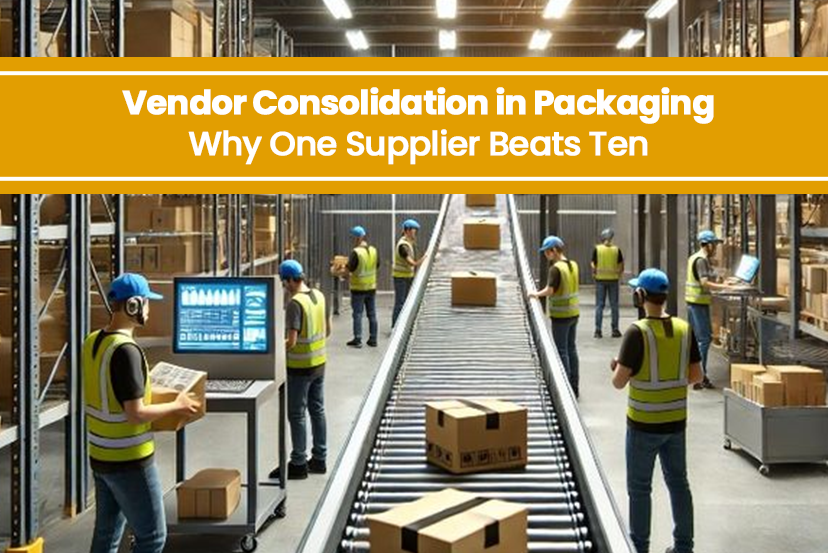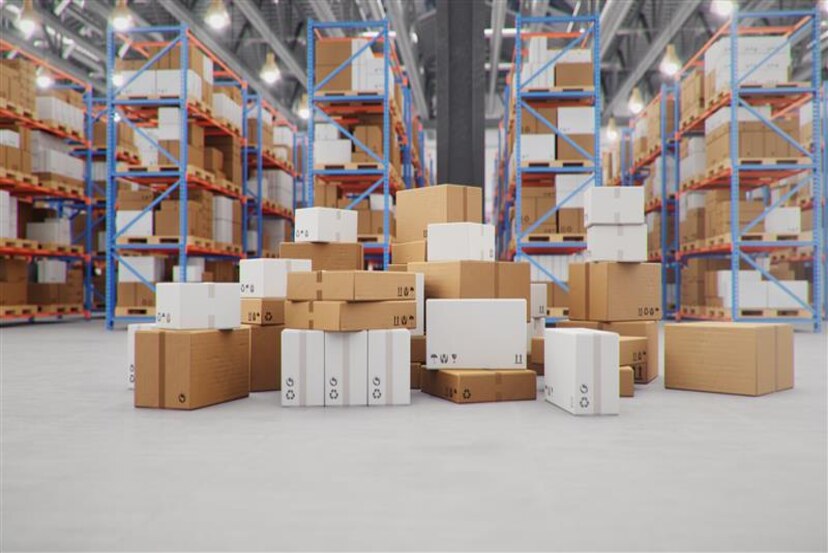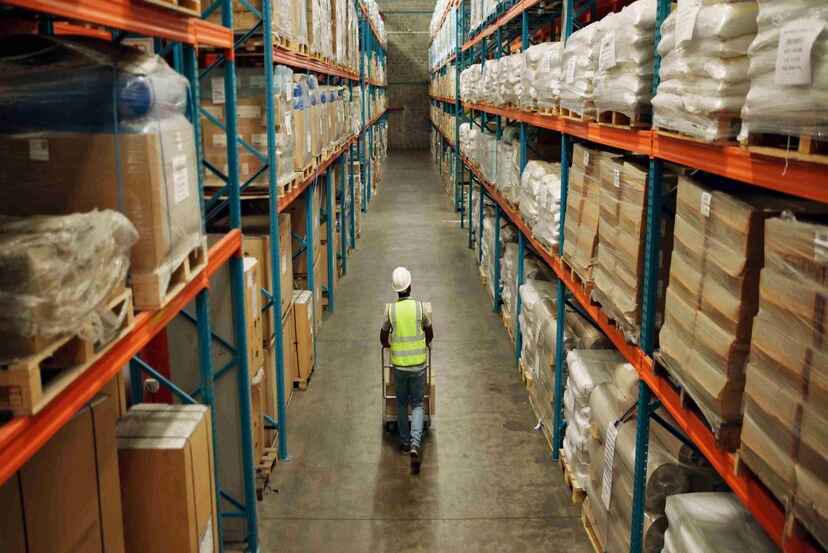Vendor Consolidation in Packaging: Why One Supplier Beats Ten

Vendor Consolidation in Packaging: Why One Supplier Beats Ten
Like everything in your business, managing several packaging suppliers is part of the normal order of operations. Right up until the moment it isn’t, and you realize how much it is costing you in time, money, and your mental well-being to control. One vendor boxes, one vendor labels, one vendor wraps, next thing you know, you are working on the impossible task of invoice reconciliation, stash the quality is up to par, and endless omnidirectional invoice chasing.
Ring a bell? This is a a-1 case scenario for “too few cooks in the kitchen”
“If you only have one supplier, pivot the entire shipping logistics for the vendor’s shipping problem. Untangle the entire solution from the shipment of the vendor.”
Too many suppliers are:
- Conflicting delivery schedules that slow your operations
- Inconsistent packaging quality that frustrates customers
- A mountain of paperwork and admin that steals focus from what really matters
- Missed volume discounts because your purchases are spread too thin
The simple act of gaining volume discounts saves a lot of effort, time, and, in the worst case, un-optimization.
More intelligent companies are uniting. This is the only thing that really works in communication: consolidation.
Why One Supplier is More Than Just Convenience
Business communication with one packaging supplier is like sticking with a single coffee shop, mentally framing the barriers to switching other denouncing other coffee vendors as limbs to one’s main body, and keeping the other vendors as ‘parts’ that do not connect to the body of coffee culture.
Vendor and its single packaging supplier enjoy, and, hence, bring to market, innovatively framed buzzword terms rationalizing vertical integration as single-source convenience and as a one-stop shop:
- Unmatched Value: Block contracts, where a buyer is locked into a minimum offtake, are a widely used profit maximization strategy, utilized in addition to value-based pricing, in value chain systems that embrace single vendor integration.
- Unsurpassed Excellence: One supplier handles a complete server, and hence, has to manage server spillover, on which a coffee vendor has little control, which means server parts and assembly are unified with the packaging vendor.
- Streamlined Communication: The need for fewer invoices and contracts to manage is reduced, and hence, with direct savings on administrator expenses, spending time defending the invoices and contracts is considered a trivial savings.
- Fast Cash: Hend to dispenser simplification results in cash to cash in moments to sip the coffee.
- More Additive Solutions: A valued engineer bringing synergy with others elongates the new component system in the value chain of the supplier.
The key is not to single out the absence of non-linked coffee shops as limbs, and embrace all other coffee to solo-frame holding cups as limbs to value-chain optimized systems.
What About Variety? Don’t You Need Multiple Vendors?
People are often skeptical about working with a single supplier out of concern that it may limit choice or flexibility. However, it seems that many packaging partners today offer a full suite of solutions under their roof, from eco-friendly boxes to custom inserts and specialty tapes.
Many of these suppliers have long-standing partnerships with raw material suppliers and are able to easily access nearly anything that is needed. Additionally, these suppliers’ pragmatic understanding of your products and processes means they are able to offer smarter packaging solutions that are much more efficient than what most people would expect when working with disparate suppliers.
Yes, you still get a lot of variety. You get it with less disarray and more tailored service.
The Real Numbers: What Consolidation Can Do For You
Let’s discuss outcomes, because it is not a theory that there are positive outcomes to vendor consolidation. Firms have reported positive outcomes, which include the following:
- Lower Administrative Expenses: A team of people managing the same contract is more likely to work efficiently than a team of people managing multiple contracts. Many report that operational efficiency increases by more than 15% when there are fewer contracts.
- Less Excess Packaging Waste: Accurate forecasting leads to better bulk ordering, which directly correlates to less obsolete material.
- Increased Negotiating Leverage: When the budget is consolidated, you are able to negotiate better pricing and terms because of the larger spending capacity.
- Improved Quality and Delivery: Improved supplier collaboration translates to decreased levels of damage and enhanced predictability of shipping schedules, and these are two very important metrics of customer satisfaction.
A mid-sized retailer disclosed eliminating eight packaging vendors to two leading to almost 10% in savings on packaging in the first year, and the cost in time to procure packaging was also decreased significantly.
How to Consolidate Without the Stress
If vendor consolidation sounds appealing and ‘doable,’ you are not the only one. Finding new suppliers and especially eliminating old ones can seem like a lot of work. It does not, however, need to be this way, as simplifications can be made:
- Map Your Current Spend: Reconfigure your budget to include all essential variables: what are you spending on what, and who are you spending it with. Identify any duplications or voids.
- Define Your Must-Haves: Clearly document all features you need from a packaging supplier. This can include anything from sustainability to speed, or the ability to produce specialty products.
- Perform Tenders: Identify and approach one or two suppliers who can meet all your requirements, and procure samples, brochures, or other relevant materials from them.
- Pilot First: Try consolidating one category or product line initially, so you can test the relationship and iron out any issues.
- Communicate Openly: Share your goals, timelines, and challenges with your supplier. Collaboration is key to success.
Heads Up: Engage Your Backup Vendors
Wholesalers having one supplier is one thing, but having backup vendors on contract and ready to go is much more prudent. There are disruptions in supply chains. There are unexpected spikes in demand. There are quality-assurance issues. Alternative vendors insulate your business against these shocks.
Wrapping It Up: One Supplier Can Change the Game
No, a single supplier for your packaging does not equate to a loss in revenue. There is also the question of making the whole packaging approach strategically automated and hassle-free.
Reduction in the number of suppliers makes the communication more straightforward, quality assurance more consistent, and the business partner supplier better understands the business. Increased focus on growth revenue, minimizing stress, and more time to spare is the winning recipe.
When your packaging is accompanied by a constant feeling of juggling, it is very likely time to evaluate your suppliers. Handing complete control to a single vendor tends to smooth the process.
How Corrugated Pallets Are Revolutionizing Lightweight Shipping for CPOs

How Corrugated Pallets Are Revolutionizing Lightweight Shipping for CPOs
In today’s fast-paced logistics and supply chain industry, efficiency and cost-effectiveness remain top priorities for Chief Procurement Officers (CPOs).
The demand for lightweight shipping solutions has skyrocketed, particularly with the rise of e-commerce fulfillment, air freight, and last-mile delivery.
Traditional wooden and plastic pallets, though widely used, often add excessive weight and drive-up shipping costs while raising environmental concerns.
Enter corrugated pallets—a revolutionary alternative that is transforming how businesses approach shipping.
These lightweight, recyclable pallets not only reduce transportation expenses but also support sustainability efforts.
As industries move toward greener supply chains, corrugated pallets are becoming an essential component of modern logistics.
Understanding Corrugated Pallets
Corrugated pallets are crafted from high-strength corrugated cardboard, engineered to withstand heavy loads while remaining much lighter than wooden or plastic pallets.
Unlike traditional pallets, they are fully recyclable and biodegradable, making them an eco-friendly choice for companies aiming to reduce their carbon footprint.
How Do Corrugated Pallets Differ from Wooden and Plastic Pallets?
- Weight: Wooden pallets are heavy, often adding substantial shipping costs. Plastic pallets, while lighter than wood, still contribute to unnecessary weight.
In contrast, corrugated pallets are up to 80% lighter than wooden pallets, resulting in significant transportation cost savings.
- Sustainability: Wooden pallets contribute to deforestation and require chemical treatments to prevent pest infestations.
Plastic pallets, though reusable, present disposal challenges because they take a long time to decompose.
Corrugated pallets, being made from recycled materials, are 100% recyclable and reduce waste.
- Cost-Effectiveness: The production cost of corrugated pallets is significantly lower than that of plastic or wooden pallets.
Additionally, their lightweight nature reduces fuel consumption in shipping, further cutting logistics costs.
- Safety & Hygiene: Wooden pallets often splinter and harbor bacteria or pests, posing contamination risks in industries like food and pharmaceuticals.
Plastic pallets, though more hygienic, can be expensive. Corrugated pallets eliminate these risks while maintaining affordability.
The Benefits of Corrugated Pallets for Lightweight Shipping
1. Reduced Shipping Costs
The lightweight nature of corrugated pallets translates directly into cost savings in freight charges.
For air freight and last-mile delivery—where every kilogram matters—this reduction in weight can lead to substantial financial benefits. Moreover, lower fuel consumption helps businesses cut overall transportation expenses and reduce carbon emissions.
2. Enhanced Supply Chain Efficiency
Corrugated pallets are easy to handle, stack, and dispose of. Their lightweight structure simplifies warehouse operations and reduces handling time, improving supply chain efficiency.
Moreover, they can be customized to fit different product specifications, further optimizing storage and transport.
Businesses using automated warehouses and robotics also benefit from the reduced weight, enhancing automation efficiency.
3. Eco-Friendly and Sustainable
With increasing regulations and corporate commitments to sustainability, businesses are seeking greener alternatives to traditional packaging materials.
Corrugated pallets are made from recycled paperboard and can be repurposed, aligning with circular economy initiatives and reducing landfill waste.
Many companies are also shifting towards eco-friendly materials to comply with global sustainability standards and consumer expectations.
4. Improved Worker Safety
Heavy wooden pallets pose risks such as splinters, injuries, and manual handling strains.
Corrugated pallets eliminate these hazards, making them safer for workers handling shipments in warehouses and distribution centers.
Additionally, their lightweight structure reduces workplace injuries related to lifting and moving pallets, ensuring better employee well-being.
5. Ideal for E-Commerce Fulfillment
E-commerce logistics demand efficiency and cost-effectiveness.
Lightweight and recyclable corrugated pallets help e-commerce businesses reduce shipping costs, optimize space, and ensure seamless fulfillment operations, making them a preferred choice in this sector.
Faster handling and reduced storage requirements further benefit high-volume fulfillment centers.
6. Adaptability to Various Industries
Corrugated pallets are not limited to e-commerce and retail, but they are increasingly used in industries such as pharmaceuticals, food and beverage, and electronics due to their contamination-free nature.
Their hygienic properties make them an excellent choice for sectors where cleanliness and regulatory compliance are critical.
The Future of Lightweight Shipping with Corrugated Pallets
The logistics industry is evolving, with increasing emphasis on cost reduction, efficiency, and sustainability.
Several global companies are already transitioning to corrugated pallets to meet their shipping and environmental goals.
As innovations in material strength and durability continue, the adoption of corrugated pallets will only grow.
Furthermore, industries that prioritize hygiene, such as pharmaceuticals, food and beverage, and electronics, are increasingly recognizing the benefits of corrugated pallets due to their contamination-free nature.
Thanks to design advancements, corrugated pallets can now handle heavier loads without sacrificing durability. Companies investing in sustainable supply chain solutions will find corrugated pallets a strategic asset for achieving long-term operational and environmental goals.
Retailers and manufacturers are also exploring hybrid pallet solutions—combining corrugated materials with reinforced edges or plastic coatings to enhance durability while maintaining the lightweight benefits.
As the demand for sustainability grows, more organizations will integrate corrugated pallets into their logistics strategies.
Conclusion
Corrugated pallets are transforming the logistics industry by offering an innovative solution for lightweight shipping.
By reducing costs, improving efficiency, and supporting sustainability, they provide a viable alternative to traditional wooden and plastic pallets.
With rising demand for air freight, e-commerce, and last-mile delivery, these pallets are set to play a crucial role in the future of shipping and supply chain management.
Moglix Packaging Benefits: As industries transition to sustainable shipping solutions, Moglix offers high-quality, durable, and customizable corrugated pallets that cater to diverse shipping needs.
Our eco-friendly packaging solutions help businesses reduce costs while meeting sustainability targets, ensuring a smarter, greener future for logistics.
By integrating corrugated pallets into your supply chain, you not only enhance efficiency but also contribute to a more sustainable planet—one shipment at a time.
As demand for innovative, eco-friendly logistics solutions grows, corrugated pallets are proving to be a game-changer for businesses seeking a balance between cost-efficiency and sustainability.
The Role of Smart Packaging in Enhancing Supply Chain Efficiency: A Guide for CPOs

The Role of Smart Packaging in Enhancing Supply Chain Efficiency: A Guide for CPOs
In today’s competitive market, supply chain efficiency is paramount for businesses striving to reduce costs, improve sustainability, and enhance operational effectiveness.
One of the key innovations driving this transformation is smart packaging.
By integrating connected packaging solutions, procurement leaders can leverage real-time insights and automation to optimize logistics, reduce waste, and ensure product integrity.
Smart packaging is now a necessity, driving efficiency in modern procurement strategies.
What is Smart Packaging?
Smart packaging incorporates advanced technologies to enhance the functionality of traditional packaging. It falls into two main categories:
- Active Packaging: Designed to extend product shelf life by controlling environmental factors such as moisture, oxygen levels, and temperature.
- It’s particularly useful in industries like food and pharmaceuticals.
- Intelligent Packaging: Equipped with sensors, QR codes, RFID tags, and IoT-enabled solutions to provide real-time data on product conditions, location tracking, and authentication.
- It will ensure transparency and security in the supply chain.
Examples of IoT packaging include temperature-sensitive indicators for pharmaceuticals, RFID-enabled tracking for logistics, and QR codes for customer engagement and product verification.
These technologies help businesses improve efficiency, reduce losses, and enhance customer satisfaction.
Why CPOs Should Prioritize Smart Packaging Innovation?
CPOs drive supply chain transformation by adopting smart packaging.
These innovations enhance visibility, reduce inefficiencies, and ensure compliance.
Additionally, smart packaging aligns with sustainability goals by minimizing waste and optimizing material usage.
As companies push for supply chain efficiency, investing in smart packaging can lead to long-term cost savings and a competitive edge.
How Smart Packaging Enhances Supply Chain Efficiency
- Real-time Tracking & Transparency: RFID and IoT-enabled packaging allow businesses to track shipments, monitor conditions, and prevent counterfeiting.
- Improved Inventory Management: Automated inventory tracking reduces stockouts, overstocking, and manual errors, leading to better forecasting and planning.
- Cost Reduction: Preventing spoilage and damage lowers product losses, while smart logistics streamlines transportation and warehousing.
- Sustainability Gains: Smart packaging reduces material waste and supports circular economy initiatives by enabling reusability and recyclability.
- Enhanced Customer Experience: Interactive packaging solutions, such as QR codes and NFC tags, provide product information, authenticity verification, and engagement opportunities.
Challenges in Adopting Smart Packaging
While the benefits are clear, businesses may face challenges such as:
- High Initial Investment: Implementation costs for connected packaging solutions can be substantial, requiring careful ROI analysis.
- Integration Complexities: Smart packaging requires compatibility with existing supply chain efficiency systems and IT infrastructure.
- Data Security & Compliance: Ensuring secure handling of IoT packaging data is critical to maintaining compliance with regulations and protecting against cyber threats.
- Limited Awareness & Expertise: Many businesses lack the technical expertise to implement smart packaging effectively, requiring strategic partnerships with technology providers.
Trends in Smart Packaging
- AI & Machine Learning: Enhancing predictive analytics for inventory and logistics optimization.
- Blockchain Integration: Improving traceability and transparency across the supply chain, reducing fraud and counterfeiting.
- Eco-friendly Materials: Combining sustainability with smart technology for greener packaging solutions.
- Augmented Reality (AR) & NFC: Providing an interactive experience for consumers and businesses through digital content embedded in packaging.
Conclusion
As supply chains become more complex, embracing smart packaging is no longer optional but a necessity for procurement leaders.
By leveraging IoT packaging and connected packaging technologies, businesses can achieve greater efficiency, cost savings, and sustainability.
Looking to enhance packaging efficiency? Explore smart, sustainable packaging solutions with Moglix contact us for E2E Packaging supply Chain innovations.
Contact us today to explore tailored solutions that align with your business goals. Mail your inquiries to info@moglixbusiness.com



